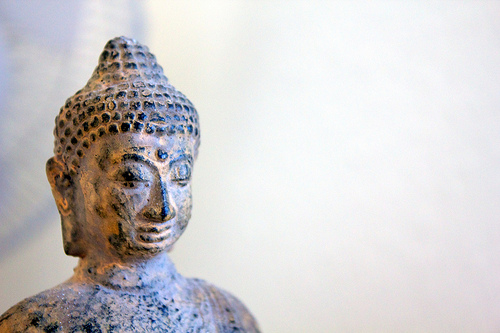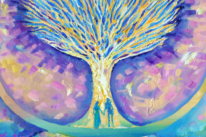“When you are immune to the opinions and actions of others, you won’t be the victim of needless suffering.” -Miguel Ruiz
Years back, in a group therapy circle, I met a man who provided an interesting definition for paranoia: It’s when you’re sitting in the bleachers at a football game, watching the players in a huddle, convinced they’re talking about you.
While I’ve never suspected professional athletes were secretly laughing at me between plays, I have taken responsibility for a lot of things that likely had nothing to do with me.
Just recently, I emailed a friend of mine from back home, only to question myself when days went by and she didn’t respond. I wondered if I’d somehow written the wrong thing. Or if there was something offensive I’d done previously that I completely forgot about.
I created all types of needless drama in my head about her opinion of me, when in all reality, it’s highly unlikely her slow response time had anything to do with me. People get busy, and most of us have way too many online accounts to check on a given day.
Even if her actions did have something to do with me, it was pointless speculate about it. She’d either tell me what was bothering her, or she wouldn’t–and if she didn’t, it was on her, not me.
I don’t know if it’s possible to be immune to other people’s opinions and actions. Because we value our relationships, we care about what those people think. But there is a difference between respecting what people think and worrying ceaselessly about what they think of us.
As a recovering people-pleaser, I often need to remind myself that what really matters is what I think of me–and that I’ll think far more of me if I resist the urge to create stories about other people’s actions.
Today if you start reading into something another person has done and stressing about his opinion of you, remember: There’s a distinct possibility it’s not about you. Until you know, it’s pointless to worry about it.

Photo by hildgrim
About Lori Deschene
Lori Deschene is the founder of Tiny Buddha. She started the site after struggling with depression, bulimia, c-PTSD, and toxic shame so she could recycle her former pain into something useful and inspire others to do the same. You can find her books, including Tiny Buddha’s Gratitude Journal and Tiny Buddha’s Worry Journal, here and learn more about her eCourse, Recreate Your Life Story, if you’re ready to transform your life and become the person you want to be.
- Web |
- More Posts












 Though I run this site, it is not mine. It's ours. It's not about me. It's about us. Your stories and your wisdom are just as meaningful as mine.
Though I run this site, it is not mine. It's ours. It's not about me. It's about us. Your stories and your wisdom are just as meaningful as mine.
Oh Lori, I do that all the time! It’s very exhausting – especially in public – to be worrying so much about if what I’m doing is okay. Isn’t it funny how we get in a mind set that the delayed email response must be because of something we did rather than the recipient is just really busy? Most of the time, I’ve found it doesn’t really have anything to do with me. And if it does it’s not the end of the world. I just keep telling myself that!
This is something I struggle with ALL THE TIME, and something I focus on frequently during meditation or through the mini meditations that get me through the day without creating so much anxiety for myself. I am a master of spinning a web of stories–and that is just what they are, “stories”–of what I possibly did wrong, or what possibly is wrong. This applies to my past as I fall into obsessive thinking patterns surrounding these stories, tortures me in the present, and even extends into my future–when I create stories (and resulting drama) about things that may or may not ever happen or not turn out like the stories I’ve created. I have found that accepting what is, being present, examining my negative obsessive thinking patterns and breaking out of them, and living with mindfulness and an open, trusting heart that respects others as well as myself all help tremendously. I don’t live blindly, but I live with more awareness, being more comfortable with uncertainty, and acceptance to what is at this moment (whether it is good or bad). I take the spotlight off myself and shine it on the world (which I am part of). And I remind myself to stop creating stories of my past, present, and future, as they don’t serve me or others well.
I had just lost ‘friend’ due to him thinking my not returning an email to him… Was about him.
I was just agonizing over an email where the person didn’t respond to my request as my expectations dictated they should have. Immediately the thoughts started looping through my mind that I’m bugging them or there must be something wrong with me – round and round we go.
Then I click on today’s Tiny Buddha and saw “It’s Not All About You”, just the words I needed to read in my current frame of mind.
From one Lori to another – Thank you!!
I’m with you, Shannon! I need to put a lot of energy into letting go of stories and resisting the urge to create them.
“I have found that accepting what is, being present, examining my
negative obsessive thinking patterns and breaking out of them, and
living with mindfulness and an open, trusting heart that respects others
as well as myself all help tremendously.” <~ Well written!
I try to catch and label thought patterns, i.e.: obsessive, destructive, speculative, etc. This really helps me step outside the mental busywork and ground myself in the moment.
I know what you mean, Jennifer. It is so draining to worry about what people think. It’s a huge relief whenever I remind myself, “It’s not all about you.” My personal mantra actually goes, “It’s not all about you, now focus on what you can do.” So instead of dwelling on what someone else may think, I focus on making progress on the things that have nothing to do with them.
Yet another great read. I really enjoy coming to this site. Always filled with gems.
Hello other Lori!
I actually had a similar email exchange today, unrelated to the one I wrote about. I requested something from someone a couple months back, and she never responded–only to follow up yesterday with a request for me. Weeks ago, I decided her lack of response was a blatant sign of disrespect–but it turns out she just got so wrapped up in her own things that she completely forgot about what I’d written. I really think 9 out of 10 times, it isn’t personal!
Lori
Sounds like taking the blue pill
I’m so sorry to hear you lost your friend…
It’s all about letting go. Letting go of the thoughts and letting go of the anxiety.
THANK YOU this post has given me a sense of perspective.
Tiny Budha saves my life every time I read it. That’s about you! Thanks!
That’s awesome, Andrew. I’m glad it helped! =)
You’re so right. It all comes back to letting to. Thanks for commenting, Katherine!
I love that mantra, Lori! I think I’ll adopt it for my little list of mantras I draw from to stay on course in daily life. Thanks! 🙂
Hi Lor,
One thing that has helped me in the, “it’s not all about you,” area, and has made me a happier person, is to drop expectations. Sometimes expectations are a necessity. However, many other times I create expectations that a person should respond in this or that way, or that a situation should have turned out in a certain way. When those expectations are not met, I create pain for myself, in the form of being hurt, disappointed, negative, etc. Sometimes expectations really aren’t that important. In those cases, when I drop the expectations, I can do things such as send a friendly email to a person I’m starting a relationship with and be done with it. If he writes back a sweet response, I can feel grateful and happy. If he doesn’t respond, I won’t take it personally… and the next time I see him he’ll likely act in a loving way totally focusing on me, as he usually does.
In the situations where you must set expectations, being a little flexible can help, too.
I’m just speaking from experience… releasing or being flexible re: expectations is something I’m working on a lot right now so your comment about the post prompted my wordy comment about your comment! Oops! 😉
Take care,
Shannon
Always food for thought, or should I say banquet.
It’s comforting to know I’m not the only one who worries when my emails aren’t replied to in a timely manner. Just this week I sent an email to someone, I didn’t hear back for 2 days, and I concluded the person had decided to ignore me. Then I got an email reply much more affirming than I could have hoped for. There was no problem, the person was just busy and didn’t reply right away.
Thanks for this post, Lori. I’m going to save it and refer to it next time I start stressing out over a tardy email reply. Whether the reply eventually comes or not, I’ll ask myself “did I express myself the way I wanted to in my message?” If the answer is yes, then I won’t worry about what kind of response I get, or if I get one at all.
Tim
thank you, Lori, i definitely relate to this post. finding this website was the best thing that’s happened to me in a long time. from the bottom of my heart, i thank you for all that you do.
I’ve been in places when most of my life was about what someone else was thinking, doing, saying. It’s a very unempowered place to be. Thank you for the reminder to keep striving and growing away from that place!
Awesome post! We all need to be reminded of this. It creates so much unnecessary internal drama! Thanks for being open in sharing your experiences.
Yes, I know all too well what internal drama feels like! I’m glad you found this helpful. =)
You’re most welcome!
Thanks Nancy. I love running Tiny Buddha, and I’m thrilled to know it’s helped you. Your comment put a big smile on my face. =)
That’s a great question to ask yourself, and I think I might borrow it. In the past, I’ve often wondered what I should have said or written to elicit an ideal response, but that’s essentially trying to control an outcome, when all we can ever really do is control how well we communicate and express ourselves.
This article was good to read at this time for me. I reached out to someone last week who is still in my life but I have had a complex relationship with them. I was very kind, honest, and nice in my voicemails I left- one on the cell and the other at their office. I know there could be a variety of reasons why I have not gotten a reply. I also know that I have tried and I liked the point made in the article- that if their actions had to do with me that it was on them to say so not me.
I’m glad this was helpful to you Susan!